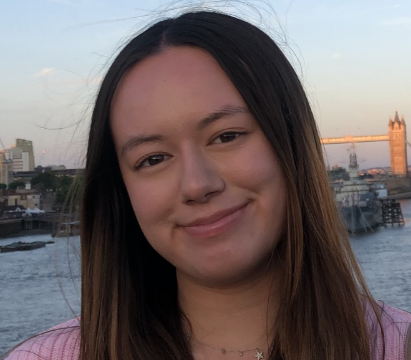Last month, I had the incredible opportunity to attend WTSFest in London for the very first time, and spoiler alert: I absolutely loved it. I discovered firsthand that WTSFest isn’t just a conference; it’s a space where women in SEO come together to learn, share, and hype each other up. From the second I walked into the Barbican Centre (a lovely venue by the way!), I felt the community and warmth of the individuals surrounding me. From the importance of accessibility in SEO to how using faceted navigation can evolve your strategy, every talk was packed with valuable insights that made me rethink how I approach SEO.

Fellow attendee and social media marketer, Himee Senanayake, said: “Attending WTSFest was an incredibly valuable experience. As someone starting out in the marketing industry, it was inspiring to meet and learn from so many successful women who have built remarkable careers in the field.”
In this blog, I’ll share my biggest takeaways - what surprised me, what inspired me, and what I’ll actually use in my day-to-day work. Whether you’re newer to SEO like me or have been in the game for years, there’s something here for everyone. Let’s dive in!
Improving Your Use of Keyword Density
“When it comes to keywords, the more the merrier.” Right?
Wrong! In her talk, Alice Rowan addressed this common myth and highlighted the importance of resisting the easy trap of keyword stuffing and, to instead, create content that is actually readable and prioritises UX. Your audience should come first, and SEO second.
Alice’s talk was filled with useful insights on how to improve your use of keyword density, but the 2 tips that stuck with me are the following…
Tip #1: Stop forcing keywords or semantic keywords into every heading.
Google’s algorithms are smart enough to determine if you’re staying on topic and creating relevant content.
Before you publish your next piece of content, ask yourself:
Can someone get the gist of what this piece is simply by scanning it?
If the answer is no, go back and take out 50% of the keywords you’ve jammed into headings and write like a human being.

(Photo by Marcelle Chamberlin, www.thechamberlins.co)
Tip #2: If the keyword doesn’t make grammatical sense, don’t use it directly.
If the keyword/phrase you’re targeting doesn’t make grammatical sense, don’t use it directly. Write around it - your readers will thank you for it. Semantic keywords are your friends so don’t be afraid to mix it up.
What not to do: What to write instead:
“Wales hotel deals” → “Best hotel deals in Wales”
“Questions exit survey” → “Questions to ask in an employee exit survey”
“Website writer SEO” → “Website copywriter and SEO specialist”
Faceted Navigation Is A Strategic SEO Tool
This talk, given by Naomi Francis-Parker, was all about faceted navigation i.e. giving users smart filters to help them find exactly what they’re looking for. With 61% of users saying they’ll leave a site if they can’t find what they need within five seconds (Forbes), she emphasised that this isn’t something brands can afford to overlook.

(Photo by Marcelle Chamberlin)
But faceted navigation isn’t just about making life easier for users; it’s also an amazing tool for understanding customer behaviour and spotting new opportunities. By tracking how users interact with these filters, you can start to:
- Discover new subcategories based on actual demand
- Tailor your site to better meet your customers’ needs
- Improve your visibility in search and stay competitive
One key takeaway from Naomi’s talk was the importance of putting tracking in place. Over time, that data becomes a goldmine for understanding trends and feeding insights about customer behaviour and demand back into your SEO and product strategies.
She also highlighted the need to review your faceted navigation regularly. Customer needs evolve, so your site structure should, too. For example, if you run a food business and Dubai chocolate is trending, add that specific category to your faceted navigation so customers can find it easily.
> Confectionary
> Chocolate
> Dubai Chocolate
And don’t forget to make sure any new subcategories fit logically into your existing site structure, using keyword research and competitor analysis to guide your decisions.
In short: faceted navigation is way more than a UX feature - it’s a strategic SEO tool when used thoughtfully.
Accessibility and SEO Go Hand-In-Hand
Lyssa-Fêe Crump’s talk was a brilliant reminder that accessibility and SEO aren’t separate goals - they go hand in hand. She broke down several key areas where improving accessibility also boosts your SEO.

(Photo by Marcelle Chamberlin)
Colour Contrast
Strong contrast makes content readable for users with visual impairments, but it also keeps people engaged longer - reducing bounce rates and helping your SEO.
Pro tip: use online contrast checker tools to make sure you’re passing accessibility standards! Here are a few:
- https://webaim.org/resources/contrastchecker/
- https://colourcontrast.cc/
- https://accessibleweb.com/color-contrast-checker/
Alt Tags
Not only do alt tags help screen readers describe images to visually impaired users, but they also give search engines context. Lyssa-Fêe’s advice? Here are her top tips:
- Write alt text that conveys meaning, not just appearance.
- No need to say ‘image of’ - screen readers already know!
- End with a full stop so the screen reader knows when to stop.
Accessible Multimedia
Adding captions, transcripts, and descriptive audio means your content is not only more inclusive, but those text-based descriptions also help search engines index content effectively and boost search visibility for audio and video.
Responsive Design
A site that adapts to all screen sizes isn’t just good for mobile UX; it’s essential for accessibility, especially for people who rely on screen readers or need to resize text. Plus, Google loves it.
Consistent Navigation
Finally, consistent navigation helps all users (not just those with disabilities) find what they need quickly and easily. It also makes your site easier for search engines to crawl. Making your site more accessible isn’t just the right thing to do, it’s also a smart SEO move.
Other Talks Worth A Shout-Out

(Photos by Marcelle Chamberlin)
(Left: Emina Demiri-Watson, Middle: Meg Sharma, Right: Shola Kaye)
AI Is Your Friend
Emina Demiri-Watson’s talk on ethical AI strategies was packed with practical tips and her enthusiasm filled the room. One standout takeaway was how to use AI tools like SBert to analyse tags on Semrush keywords and cluster keywords, and then use that data segmentation to help spot content gaps and improve coverage. It’s a clever way to make your content strategy smarter and more efficient, without needing a massive budget.
Using Social Trends To Your Advantage
Meg Sharma’s talk on using the power of social trends for SEO was a real eye-opener and was one of fellow attendee, Himee Senanayake’s standout moments from the entire day! Meg shared how brands can adapt trending topics to make them relevant for their audience - like this brilliant example of turning “brat summer” into something relatable for parents.

She also reminded us that tools like AHRefs and Semrush often lag behind real-time trends and are still catching up on target keywords, so you might need to do your own trend research on socials. Meg also introduced a super helpful framework for spotting trends, categorising them (micro, short-term, macro, and long-term), and assessing how they fit with your target audience and platform. As one attendee, Himee, put it: “Her perspective gave me a fresh understanding of how to utilise trends strategically.”
If You Don’t Ask, You Don’t Get
Shola Kaye’s talk about the power of asking was one of my favourite talks and was the perfect way to end the day. She framed asking as an act of self-inclusion and reminded us not to leave our careers to chance. Whether it’s feedback, mentorship, role clarity, or new opportunities, asking puts you in the driver’s seat.
Ask yourself:
If you knew that 'yes' was guaranteed, what would you ask for right now that could transform your career or life?
This was one of the questions she asked us to help us reflect on what we really want from our career. And even if, in reality, the answer we receive is ‘no,’ it brings clarity and opens doors for growth. I left her talk feeling genuinely empowered and ready to be more intentional about my own career moves.
Final Words
One of the best things about WTSFest London wasn’t just the incredible talks - it was the atmosphere. Networking can sometimes feel a little daunting, but here, it felt effortless. As Himee perfectly put it: “Beyond the talks, the entire environment at WTSFest made networking feel far less intimidating. I had the opportunity to connect with incredible women in the industry, which I am truly grateful for. Events like these, where women can learn from and support one another, are rare, and I deeply appreciate WTSFest for creating that space.”
The day ended on a high with a fabulous afterparty at the Barbican Conservatory, complete with great conversations, delicious appetisers, and a well-earned glass of prosecco.

WTSFest wasn’t just an SEO event, it was a reminder of the power of community. I left feeling inspired, supported, and excited to continue growing in this space. Knowing I have a network of talented women cheering me on makes things like one day giving my own talk in front of hundreds of people feel way less intimidating.
Our SEO Copywriter Ella Wilson also commented: "I adore that there's such an inclusive community available to women in SEO, and the fact that they delivered an event with so many actionable lessons in how to produce more accessible and ethical work is honestly a gift!"
If you’re in SEO and haven’t been to a WTSFest SEO conference yet, I can’t recommend it enough - I know I’ll definitely be back!
For more insights from the team, check out our blogs or get in touch with us today.
Contact Us
MEET THE AUTHOR.
AMELIA MILES
Amelia is our SEO Executive, immersed in the world of digital marketing. She brings enthusiasm to learning from our professionals and applies creativity and psychological insights to our SEO strategies. With her natural curiosity and commitment, she contributes to our mission of helping clients achieve their goals and is a positive addition to the team.
More about Amelia
























